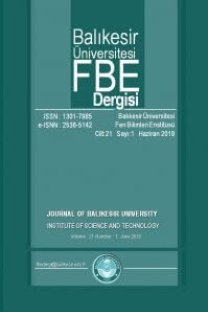İlköğretim 7.Sınıf Matematik Öğretiminde Aktif Öğrenmenin Öğrenci Başarısı Üzerine Etkisi
Öğrencilerin matematiği sevmesi ve başarılı olabilmesi için öğretimde değişiklikler yapmak ve yeni öğretme ve öğrenme modellerine yönelmek gerekmektedir. Bu çalışmada, Aktif Öğrenmenin öğrenci başarısı üzerindeki etkisi belirlenmeye çalışılmıştır. Bu amaçla öğrenciler ile uygulama yapılarak konu ile ilgili veriler derlenmiş ve analiz edilmiştir. Balıkesir ilinin Dursunbey ilçesinde merkeze bağlı Sabahattin Göndür İlköğretim Okulu'ndaki 7. Sınıf öğrencilerine (ndeney=20, nkontrol=22, ntoplam=42) "çember ve daire" konusunun aktif öğrenme yöntemleri ve geleneksel yöntemler kullanarak öğretimi yapılmış ve bu iki yöntemin öğrencilerin başarısına etkisi incelenmiştir. Deney grubu öğrencilerine Aktif Öğrenme Yaklaşımına uygun etkinliklerle ("pi sayısı ve çemberin çevresi", "dairenin alanı") ve kontrol grubu öğrencilerine geleneksel yöntemler kullanılarak öğretim yapılmıştır. Uygulamadan önce ölçme aracı olarak gruplara öntest verilmiştir. Uygulama bitiminde gruplara sontest uygulanmıştır. Aktif öğrenme yöntemlerinin geleneksel yöntemlere göre öğrencilerin başarısında daha etkili olduğu sonucuna varılmıştır. Deney grubu öğrencilerinin aktif öğrenme yöntemlerinin uygulanmasından önce ve sonra matematik başarılarında geleneksel yöntemlerin uygulandığı kontrol grubuna göre anlamlı bir fark gözlenmiştir
THE EFFECT OF ACTIVE LEARNING ON STUDENTS’ ACHIEVEMENT AT MATHEMATICS TEACHING OF 7th GRADE
It requires that teaching methods must be changed and modern learning and teaching techniques must be used if we want pupil to like and to be successful at mathematics. This study was designed to determine the effect of active learning theory on students' mathematics achievement. For this purpose, the data which collected during the treatment were evaluated and discussed. The topic of "circle" was thought to 7th grade pupil (ne=20, nc=22, nsum=42) in Dursunbey Sabahattin Göndür Secondary School in Balıkesir by using active learning methods and traditional teaching methods and examined the effect of this two methods on students' achievement. In the experiment group active learning activities ( "pi number and circumference of circle", "area of circle") was used. Control group was taught by tradional teaching methods. Before treatment a pre-test was given to pupils and the end of treatment post-test was practiced. The findings show that active learning is more effective than tradional teaching methods. A significant difference was observed in mathematics achievement between experiment group and control group after treatment
Keywords:
Active learning, tradional teaching methods,
___
[1] Kyriacou, C., "Active Learning in Secondary School Mathematics", British Educational Journal, 18, 3, (1992).[2] "Learning Matehematics and Science Through Active Learning", http://www.nap.edu/readingroom/
[3] Smith, J., "Active Learning of Mathematics", Mathematics Teacher, 154, (1996).
[4] Çömlekoğlu, “G., Öğretmen Adaylarının Problem Çözme Becerilerine Hesap Makinesinin Etkisi”, Yüksek Lisans Tezi, Balıkesir Üniversitesi Fen Bilimleri Enstitüsü, Matematik Eğitimi Ana Bilim Dalı, Balıkesir, (2001).
[5] Hartley, J., Davies, I., K., "Note-taking: A critical review", Programmed Learning and Educational Technology, 15, (1978).
[6] Açıkgöz, K.Ü., “Aktif Öğrenme”, Eğitim Dünyası Yayınları, İzmir, (2002).
[7] Laws, P., Sokoloff, D. & Thornton, R., "Promoting Active Learning Using the Results of Physics Education Research", http://science.uniserve.edu.au/newsletter/vol13/sokoloff.html.
[8] Rosenthal, J.S., "Active Learning Strategies in Advanced Mathematics Classes", Studies in Higher Education, 20, 2, (1995)
[9] Ersoy, Y., "Mathematics Education in Turkey: Challenges, constraints and need for an innovation", IN: Proc, IACME-8, UNESCO Pub. (ED-92 WS-11), Paris, s.156-158, (1992).
[10] TIMMS (Third International Mathematics and Science Study), http://TIMMS.bc.edu/TIMMS/presspop3.html, (1999).
[11] Gür, H., “Active Learning”, Doktara Tezi, (1999).
[12] Pekin, H., “İlköğretim 5. Sınıf Geometri Dersinde Aktif Etkileşimli Öğrenme”, Yayımlanmamış Yüksek Lisans Tezi, Uludağ Üniversitesi Fen Bilimleri Enstitüsü, Matematik Eğitimi Ana Bilim Dalı, Bursa (2000).
[13] Çepni, S., Araştırma ve Proje Çalışmalarına Giriş. Trabzon: Erol Ofset Matbaacılık, 2001.
[14] Karasar, N., “Bilimsel Araştırma Yöntemi”, Nobel Yayın Dağıtım, Ankara, (1998).
[15] Altun, M., “Matematik Öğretimi”, Alfa Yayıncılık, İstanbul, (2001), s.8
- ISSN: 1301-7985
- Yayın Aralığı: Yılda 2 Sayı
- Başlangıç: 1999
- Yayıncı: Balıkesir Üniversitesi
Sayıdaki Diğer Makaleler
Türkiye'de Tükenme Tehlikesinde Olan Bir Türün Otekolojisi: Amsonia orientalis Decne. (Apocynaceae)
Endüstriyel Uygulamalar İçin Manyetik Tahribatsız Test Sistemi
Yavuz EGE, Mustafa GÖKTEPE, Osman KALENDER
Tuzla Amaçlı Yeni Bir Buharlaştırma Sistemi
İlköğretim 7.Sınıf Matematik Öğretiminde Aktif Öğrenmenin Öğrenci Başarısı Üzerine Etkisi
In(x)Al(1-x)As Bileşik Yarıiletken Malzemelerde Kalıcı Fotoiletkenlik
1,3-Bis-(p-İminobenzoik Asit) İndan Langmuir-Blodgett (LB) Filmlerin Elektriksel Özellikleri
Hüseyin SARI, Tayfun UZUNOĞLU, Onur TURHAN
Öğretmen Adaylarının Problem Kurma Becerilerinin Belirlenmesi
Sığır Adrenal Korteksi Üzerine Histolojik Ve Biometrik Bir Çalışma
